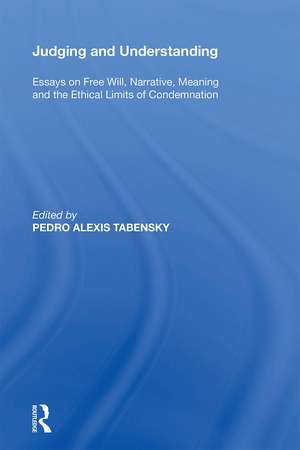Judging and Understanding: Essays on Free Will, Narrative, Meaning and the Ethical Limits of Condemnation
Editat de Pedro Alexis Tabenskyen Limba Engleză Paperback – 28 feb 2022
Preț: 230.53 lei
Nou
Puncte Express: 346
Preț estimativ în valută:
44.11€ • 46.17$ • 36.72£
44.11€ • 46.17$ • 36.72£
Carte disponibilă
Livrare economică 10-24 martie
Livrare express 21-27 februarie pentru 26.36 lei
Preluare comenzi: 021 569.72.76
Specificații
ISBN-13: 9781138356276
ISBN-10: 1138356271
Pagini: 300
Dimensiuni: 152 x 229 x 19 mm
Greutate: 0.43 kg
Ediția:1
Editura: Taylor & Francis
Colecția Routledge
Locul publicării:Oxford, United Kingdom
ISBN-10: 1138356271
Pagini: 300
Dimensiuni: 152 x 229 x 19 mm
Greutate: 0.43 kg
Ediția:1
Editura: Taylor & Francis
Colecția Routledge
Locul publicării:Oxford, United Kingdom
Cuprins
Contents: Introduction. Part I Narrative, Explanation and Forgiveness: The Limits of Condemnation: Equity and mercy, Martha Nussbaum; Explanation and condemnation, Ward E. Jones; Understanding 'understanding' in The Reader, Brian Penrose; Living with the self: self-judgement and self-understanding, Samantha Vice; The case for moral complexity, Marc Fellman. Part II Free Will, Determinism and Moral Responsibility: Challenging Retributive Judgment: Moved movers: transfiguring judgment practices, Pedro Alexis Tabensky; Philosophy, determinism and moral responsibility in times of atrocity, Chandra Kumar; Is to understand to forgive or at least not to blame?, Kai Nielsen; The real me, Jonathan McKeown-Green. Part III The Ethical Function of Condemnation: Judging because understanding: a defence of retributive censure, Thaddeus Metz; Understanding condemnation: a plea for appropriate judgement, Peta Bowden and Emma Rooksby; Humanizing evil-doers, Andrew Gleeson; The unbearable space of Schlink's persona, Richard H. Weisberg. Index.
Notă biografică
Pedro Alexis Tabensky is Lecturer in the Department of Philosophy, Rhodes University, South Africa
Descriere
This collection embodies a debate that explores what could be characterised as the tension between judging and understanding. It seems that after a particular threshold of understanding of the basic facts leading to a given moral transgression, the more we understand the context and motives leading to crime, the more likely we are to abstain from harsh retributive judgement.
